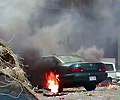


The first underground shelters at Kaymakli in Cappadocia were carved by Christians in the 9th and 10th centuries. Over time, the city was expanded and deepened. There were stables, warehouses and cellars, what made it self-sufficient during the siege. The underground city of Kaymakli differs from Derinkuyu, with which it was connected by many kilometers of tunnels. The tunnels are lower and narrower here. This forced people to walk one after another. A large and heavy disk-shaped stone doors provided an additional security. Such design gave a defensive advantage during enemy raids.






